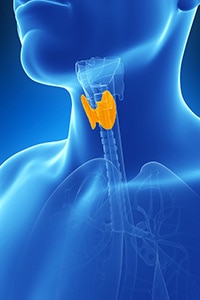Endocrine Diseases & Metabolic Diseases

Endocrine and metabolic diseases span a vast range of conditions. Together, they affect many millions of Americans and can profoundly decrease quality of life. NIDDK supports research on many of these conditions, including osteoporosis, cystic fibrosis, hypothyroidism, and obesity. Osteoporosis is a disease marked by reduced bone strength and linked to aging and fracture risk. 53 million people in the United States either have or are at risk for osteoporosis. Hypothyroidism, or underactive thyroid, affects about 4.6 percent of the U.S. population age 12 and older. More than 30,000 Americans have cystic fibrosis, an inherited disease in which salt and water cannot flow appropriately in many critical tissues. Despite dramatic advances in treatment and life expectancy, cystic fibrosis substantially reduces lifespan and its management is challenging. As people are living longer with this disease, cystic fibrosis-related diabetes has emerged as a common problem. While treatments have improved for many of these diseases, we have much to learn about the complex interaction between genetic and environmental factors that underlies their progression and which may provide avenues to prevention and new therapies.
Examples of NIDDK-supported research efforts in these areas include:
- Studies of environmental factors that may alter thyroid function.
- Research building on discoveries about the specific effects of various cystic fibrosis-causing genetic mutations in order to develop therapies that counteract the disease at a molecular level.
- Studies increasing our understanding of how cells sense and respond to available fuel and nutrient levels.
- Experiments aiming to understand the molecular mechanisms underlying autoimmune disorders such Hashimoto’s thyroiditis and Graves disease.
- Research to understand the role of parathyroid hormone in bone health and to identify the best treatment for hyperparathyroidism, a condition in which the parathyroid glands produce too much hormone.
- Studies of bone health and fracture risk in relationship to diseases and conditions such as obesity and weight loss surgery; underweight; and type 1 and type 2 diabetes.
In addition, NIDDK responds to questions and provides health information about endocrine diseases to people with endocrine diseases and to their families, health professionals, and the public via the NIDDK Health Information Center.
Research Updates and News
- Novel computational pipeline approach leads to discovery of possible new treatments for the endocrine disorder hyperparathyroidism
- Selective Fat Cell Elimination in Mice Leads to a Profound Increase in Bone Mass
- Succinate Regulates Muscle Adaptations to Exercise in Mice and Humans
- Fat cell signaling molecules identified as critical for regulating metabolic health in mice
- How the gut microbiome controls daily metabolic rhythms
What We Do
To achieve its mission, NIDDK supports, conducts, coordinates, and plans research. NIDDK also provides data and samples from NIDDK-funded studies and explains research findings to health professionals and the public.
Support Research
NIDDK invests in basic, clinical and translational research and training at colleges, universities and other institutions.
- Bioengineering, Biotechnology, and Imaging as applied to Diabetes, Metabolic, and Endocrine Diseases
- Cystic Fibrosis
- Diabetes and Metabolism HIV/AIDS
- Diabetes, Endocrine, and Metabolic Disease Translational Research
- Endocrine Pancreas
- Endocrine Tumors of the Pancreas
Conduct Research
NIDDK investigators conduct biomedical research and training in the Institute's laboratories and clinical facilities in Maryland and Arizona.
- Diabetes, Endocrinology, and Obesity Branch
- Laboratory of Bioorganic Chemistry
- Laboratory of Cell and Molecular Biology
- Laboratory of Cellular and Developmental Biology
- Laboratory of Endocrinology and Receptor Biology
Coordinate & Plan Research
NIDDK takes multiple approaches to research planning and priority setting.
Meetings & Workshops
There are no upcoming related meetings or workshops at this time.
View all Meetings & WorkshopsStrategic Plans & Reports
- NIDDK Strategic Plan for Research
- Diabetes in America
- Diabetes in America, 3rd Edition
- Special Statutory Funding Program for Type 1 Diabetes Research: Progress Report
- Advances & Emerging Opportunities in Diabetes Research: A Strategic Planning Report of the Diabetes Mellitus Interagency Coordinating Committee
Provide Access to Research Resources
NIDDK makes publicly supported resources, data sets, and studies available to researchers.
View all Research ResourcesProvide Health Information
NIDDK provides patient education information, practice tools for diagnosis and treatment, and statistics.

